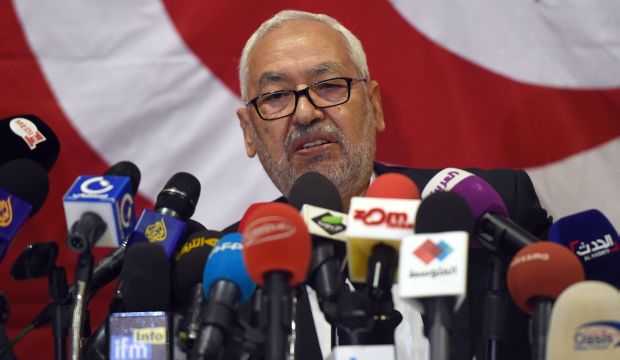
Tunisian Ennahda party founder and leader Rachid Ghannouchi speaks during a press conference in Tunis on October 30, 2014. (AFP/Fethi Belaid)
Tunis, Asharq Al-Awsat—Tunisia’s Ennahda party leader Rachid Ghannouchi called for the formation of a national unity government in the North African republic, warning that no political party in the country should seek to monopolize power at the present time.
His comments are published a day after the final results of the parliamentary elections were announced by the authorities, declaring that Tunisia’s liberal Nidaa Tounes party had won the right to form a new government after winning the most seats, securing a total of 85 out of 217 seats. Ghannouchi’s own Ennahda party came second with 69 seats.
Nidaa Tounes, led by Beji Caid El-Sebsi, ran on a strong anti-Islamist platform with many now wondering whether the party will seek to exclude Islamists from the next government. Nidaa Tounes is, constitutionally, capable of forming a new government on its own, based on the backing it has received from small secular and liberal parties, but may face political difficulties if it tries to exclude Tunisia’s second largest party.
In a broad-ranging interview with Asharq Al-Awsat, Ghannouchi said that Tunisia’s best interests would be served by the nomination of a “consensus presidential candidate” ahead of presidential elections scheduled for next month. Sebsi is a leading contender to win the presidential poll, succeeding interim president Moncef Marzouki. However Ghannouchi called on the Nidaa Tounes leadership to ensure that they “conduct their affairs according to democratic norms.”
“Tunisia has not completely turned the page on tyranny and rigged elections and swearing allegiance to a dictator and depriving Tunisian nationals from their right to freedom of choice. Our goal is to ensure democracy triumphs over chaos and dreams of coup d’etat,” Ghannouchi said.
He added that “Tunisia does not need protest parties, but rather it needs compromise parties that are capable of rule, as well as a mature and responsible [political] elite that rejects all forms of exclusion. After the elections, voters do not expect to see political conflict, but rather a strong state that achieves security, stability and economic development supported by political parties who are aware of their responsibilities.”
The Ennahda party leader also warned against a repeat of the political “polarization” model in Egypt where the Muslim Brotherhood has now been outlawed. Ghannouchi’s own Ennahda party has been said to have been “inspired” by the Islamist movement and enjoyed friendly relations with the former Mursi government in Egypt.
“Democracy in Tunisia is in a transitional stage and cannot handle a return to the conflict between the state and an opposition force. This is why we believe that the majority [of political parties] are incapable of leading the next stage and that the solution is consensus based on mutual trust between Tunisia’s various [political] actors,” he said.
“Although we have secured political gains following the revolution this does not mean we have achieved all the demands of the revolution,” Ghannouchi added.
